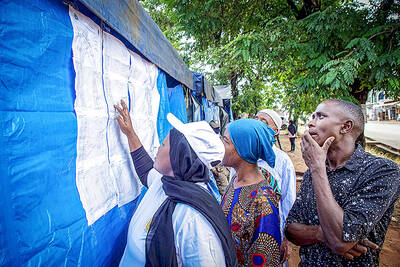Chinese-backed Tibetan leaders will soon set a date for what they call “Serf Liberation Day” to mark the defeat 50 years ago of a pro-independence uprising in the Himalayan region, state media reported yesterday.
A holiday to mark the “emancipation of millions of serfs and slaves” in Tibet will be decided on during a meeting of the region’s legislature starting on Wednesday, Xinhua news agency said.
The entry of Chinese forces into Tibet in 1949 was followed by efforts to transform the Buddhist, feudal order into a socialist, secular society. Tibetans rebelled on March 10, 1959, to try an oust the Chinese, but the uprising ended after 20 days with the flight of the Dalai Lama, the Tibetan spiritual leader, into exile in India.
A bill to decide on a holiday marking those events will be presented during the second annual session of the ninth Tibet Regional People’s Congress, Xinhua said.
The bill is aimed at “reminding all the Chinese people, including Tibetans, of the landmark democratic reform initiated 50 years ago,” Pang Boyong, deputy secretary general of the Tibetan regional congress standing committee, said on Saturday, according to the report.
“Since then, millions of slaves under the feudal serfdom became masters of their own,” Pang said.
Critics of Chinese rule in Tibet note the region remains one of China’s poorest and say most of the benefits of economic development have gone to members of the Han Chinese majority, rather than to Tibetans.
They accuse the government of enforcing policies intended to destroy the indigenous culture and language and of persecuting Tibetan Buddhists loyal to the Dalai Lama.
In the report, Pang also criticized the Dalai Lama and his supporters for “sabotaging” the Communist Party’s system of regional autonomy in Tibet.
“They are against the will of the Tibetan people and running against the historical trend of progress in this region,” he was quoted as saying.
Beijing demonizes the 1989 Nobel Peace Prize laureate and claims he seeks to destroy China’s sovereignty by pushing for independence for Tibet. The Dalai Lama says he wants “real autonomy” for Tibet, not independence.

With much pomp and circumstance, Cairo is today to inaugurate the long-awaited Grand Egyptian Museum (GEM), widely presented as the crowning jewel on authorities’ efforts to overhaul the country’s vital tourism industry. With a panoramic view of the Giza pyramids plateau, the museum houses thousands of artifacts spanning more than 5,000 years of Egyptian antiquity at a whopping cost of more than US$1 billion. More than two decades in the making, the ultra-modern museum anticipates 5 million visitors annually, with never-before-seen relics on display. In the run-up to the grand opening, Egyptian media and official statements have hailed the “historic moment,” describing the

‘CHILD PORNOGRAPHY’: The doll on Shein’s Web site measure about 80cm in height, and it was holding a teddy bear in a photo published by a daily newspaper France’s anti-fraud unit on Saturday said it had reported Asian e-commerce giant Shein (希音) for selling what it described as “sex dolls with a childlike appearance.” The French Directorate General for Competition, Consumer Affairs and Fraud Control (DGCCRF) said in a statement that the “description and categorization” of the items on Shein’s Web site “make it difficult to doubt the child pornography nature of the content.” Shortly after the statement, Shein announced that the dolls in question had been withdrawn from its platform and that it had launched an internal inquiry. On its Web site, Le Parisien daily published a

UNCERTAIN TOLLS: Images on social media showed small protests that escalated, with reports of police shooting live rounds as polling stations were targeted Tanzania yesterday was on lockdown with a communications blackout, a day after elections turned into violent chaos with unconfirmed reports of many dead. Tanzanian President Samia Suluhu Hassan had sought to solidify her position and silence criticism within her party in the virtually uncontested polls, with the main challengers either jailed or disqualified. In the run-up, rights groups condemned a “wave of terror” in the east African nation, which has seen a string of high-profile abductions that ramped up in the final days. A heavy security presence on Wednesday failed to deter hundreds protesting in economic hub Dar es Salaam and elsewhere, some

Flooding in Vietnam has killed at least 10 people this week as the water level of a major river near tourist landmarks reached a 60-year high, authorities said yesterday. Vietnam’s coastal provinces, home to UNESCO world heritage site Hoi An ancient town, have been pummeled by heavy rain since the weekend, with a record of up to 1.7m falling over 24 hours. At least 10 people have been killed, while eight others are missing, the Vietnamese Ministry of Natural Resources and Environment said. More than 128,000 houses in five central provinces have been inundated, with water 3m deep in some areas. People waded through